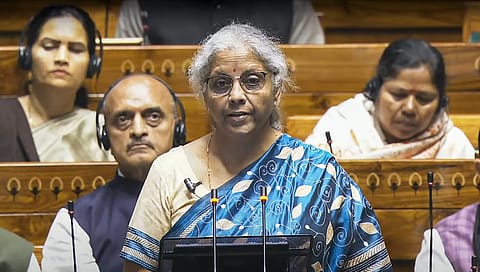FM Sitharaman announces National Manufacturing Mission
The National Manufacturing Mission's mandate will include ease and cost of doing business, future-ready workforce, MSME sector, and availability of tech and quality products

The Union Budget 2025-26 has launched a 'Manufacturing Mission', to further the 'Make in India' concept and the mission will also promote 'Clean Tech' manufacturing.
''Our Government will set up a National Manufacturing Mission covering small, medium and large industries for furthering “Make in India” by providing policy support, execution roadmaps, governance and monitoring framework for central ministries and states,'' Union Finance Minister Nirmala Sitaraman said in her budget speech.
The Mission’s mandate will include 5 focus areas - ease and cost of doing business, future-ready workforce for in-demand jobs, a vibrant and dynamic MSME sector, availability of technology and quality products, she said.
The Mission will also support Clean Tech manufacturing and will aim to improve domestic value addition and build an ecosystem for solar PV cells, EV batteries, motors and controllers, electrolysers, wind turbines, very high voltage transmission equipment and grid-scale batteries.
The budget also announced zero customs duty exemption for many critical raw materials going into the production of clean tech machinery. These include waste and scrap of antimony, beryllium, bismuth, cobalt, cadmium, molybdenum, rhenium, tantalum, tin, tungsten, zirconium and copper scrap. these were attracting a Customs Duty of 10/5/2.5% earlier. Similarly, waste and scrap of Lithium-Ion Battery, Cobalt powder, waste and scrap of lead waste and scrap zinc, which attracted 5% customs duty earlier, have been exempted fully from customs duty. The budget also provided tax reliefs for solar modules, 35 capital goods/machinery for use in the manufacture of lithium-ion batteries for EVs and 28 capital goods/machinery for use in the manufacture of lithium-ion batteries for mobile phones.
''A key highlight is the focus on cleantech supply chains, with a manufacturing mission for building the domestic ecosystem for all critical clean technologies including transmission equipment. Duty exemptions for essential minerals like cobalt powder, lithium-ion battery scrap, and lead, alongside capital goods exemptions for 35 additional EV battery components, will strengthen domestic value chains,'' said Anvesha Thakker, Partner, Business Consulting and National Lead for Clean Energy at KPMG in India.
The exemption of Basic Customs Duty (BCD) on cobalt powder, lithium-ion battery waste, scrap, and 12 other critical minerals ensures a steady supply of essential raw materials for industries such as electric vehicles, energy storage, and electronics while reducing input costs and boosting domestic manufacturing, said Amit Kumar, Partner and Climate Ecosystem Leader, Grant Thornton Bharat.
Recommended Stories
''Strategic initiatives like global manufacturing clusters and clean tech advancements under the National Manufacturing Mission will position India as a global industrial powerhouse. By promoting domestic production of critical components like wind turbines, solar components, electrolysers and batteries, we’re fostering innovation and sustainable growth,'' said Vineet Mittal, Chairman, Avaada Group.
Saurabh Kumar, Vice President - India, Global Energy Alliance for People and Planet (GEAPP) said the Budget builds on India’s aim to become a global leader in renewable energy. ''The National Manufacturing Mission will provide impetus to domestic production of clean technologies such as solar PV cells and grid-scale batteries and will scale up the deployment of renewable energy and make India a crucial link in the global supply chains,'' he said.